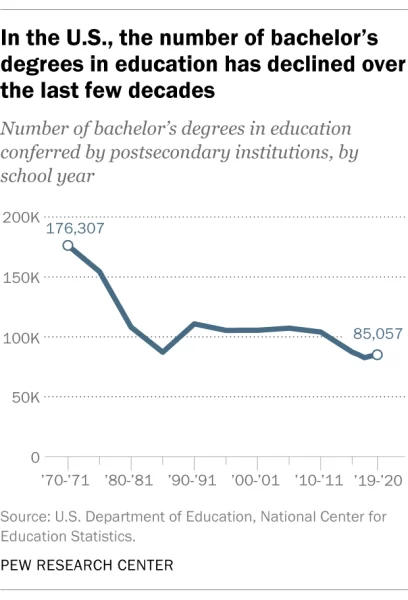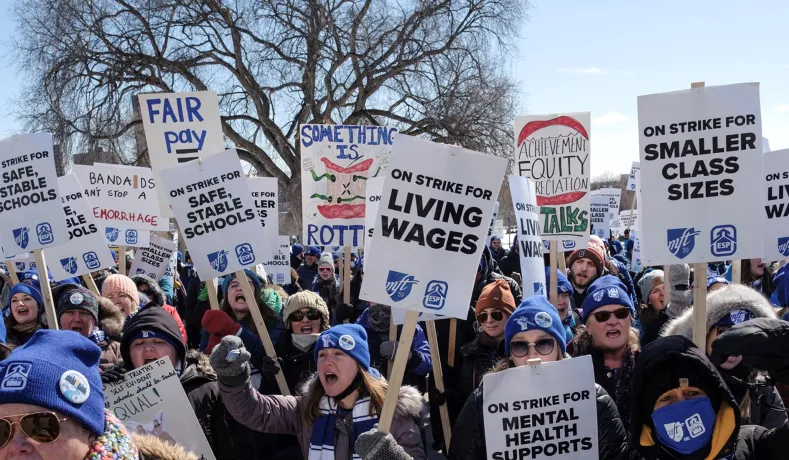The compensation of teachers in our country is something that everyone talks about, but no one does anything to fix it. As a teacher’s daughter, I grew up watching my mom work incredibly hard and never receive recognition for it. She spent hours writing lesson plans and grading papers. We would spend the last few weeks of summer setting up her classroom. She went to work early and came home late, working around the clock to give her students the best care. And in return, she and the hundreds of thousands of teachers like her received little pay.
Unsubstantial pay, along with other factors, has resulted in more and more teachers leaving the profession. Other districts across the country have already seen teachers on strike, and some have even been forced to shut down schools due to the lack of teachers. If something is not done soon to address teachers’ working conditions and compensation, more districts could face the same problem.
About four months ago, 4,500 teachers didn’t show up to work in Portland, Oregon. They were on strike for over three weeks, demanding higher pay, limits on class size, mandatory staffing levels, and planning time. Since COVID–19, schools in Portland have seen a drop in the number of teachers, leaving the schools with too many students and too few teachers to handle them.

And this is a trend happening everywhere! Nationally, the number of teachers leaving the classroom is far greater than the number entering the classroom. Forbes reports that since the beginning of 2020 (the start of COVID-19), half a million teachers have left the profession, and the annual quitting rate of teachers has increased from 8% to 9.1%.
Meanwhile, Pew Research Center reports that the number of college graduates with a degree in education has decreased significantly over the past decades. In 2020, 85,057 students graduated with a bachelor’s degree in education (about 4% of the total two million degrees issued that year). Comparatively, 19% of college graduates had their degree in education in 2001. And, in 1971, 21% of college graduates were in education.
This trend has occurred as women have advanced to once-male-dominated fields. In 1971, being a teacher was extremely common because women weren’t welcome in other fields. Women couldn’t excel in engineering, business, or science, so many were teachers. Now, women work in thousands of fields! And while that’s something to be celebrated, it also leaves a gaping hole in the field of education.
For example, of 4,818 LSU graduates last year, 430 (8.9%) graduated with an education degree. While 8.9% is well above the national percentage of students majoring in education, 338 of the 430 graduates specialized in physical education. Most schools have little need for more than a few P.E. teachers. Therefore, the actual percentage of teachers entering the workforce from LSU, including art education and music education majors, was 1.9%. That percentage is terrifying.
Teachers are a crucial part of our society. We need to acknowledge their worth and compensate them fairly. Otherwise, the number of teachers will continue to decline until we are left with a dangerous problem.
Our society tends to define the value of workers by the amount of education they have received. It takes about eight years to become a dentist, and they’ll end up making over $200,000 a year. On the other hand, there are almost no requirements to become a waitress, and they’ll earn minimum wage.
However, the effort required to complete a job is not weighed as heavily when the worker’s salary is determined. Having been to both a busy restaurant and a dentist’s office, I’m confident in my assumption that a waitress has a more stressful job than a dentist. While I’m not saying that a waitperson should be making the same amount of money as someone who has received eight years of a college education, I think the effort and vigor it takes to do a job should be more carefully considered when wages are being determined.
Another example of worth being unfairly defined was when East Baton Rouge Parish bus drivers went on strike in August for higher pay. Driving a giant vehicle while trying to control a group of loud, rambunctious children is no easy feat. Even though minimal education is required to be a school bus driver, it’s a strenuous job and should be compensated appropriately.
Teachers, famously, have one of the most difficult jobs, and I believe their salaries should be more reflective of that. If school boards continue to underpay teachers, the country could face a massive teacher shortage. To provide children with healthy, whole educations, we must start by redefining the worth of our teachers.

















































